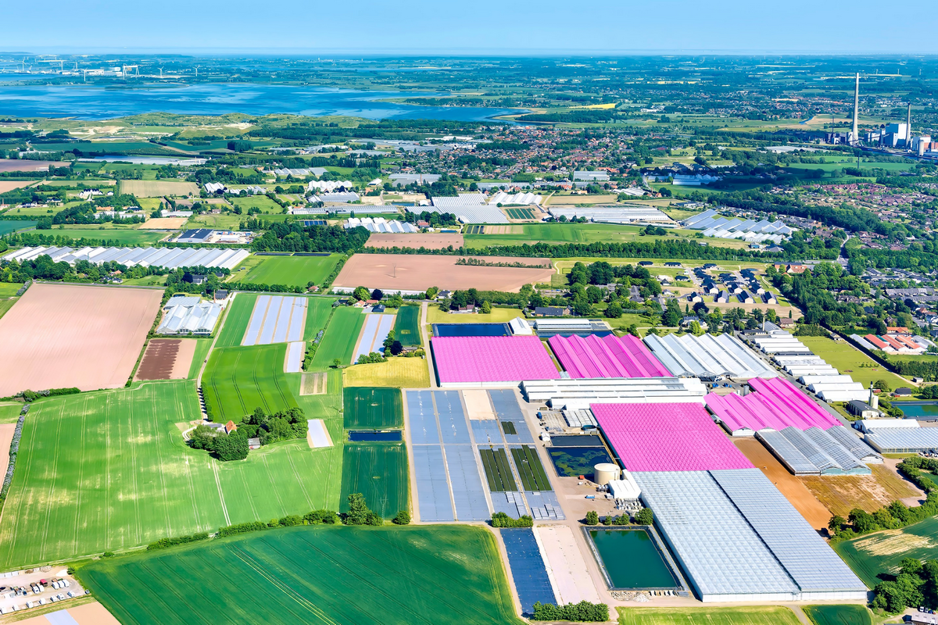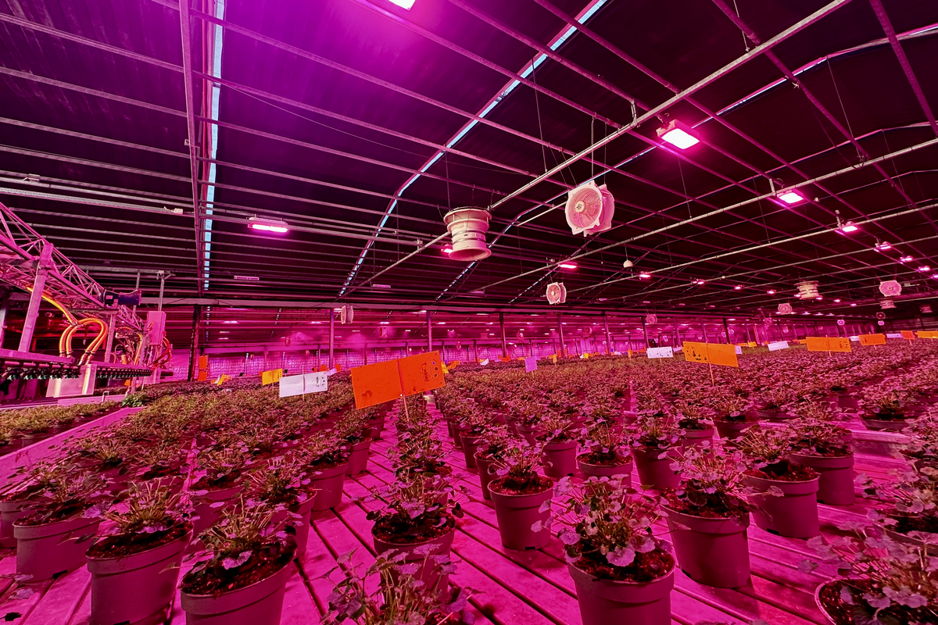"This LED-lighting system will revolutionize the way we produce plants," says Merih Tesfamicael, Quality & Environmental Manager at Gartneriet PKM. Recently, this Danish nursery upgraded their greenhouse area with 73,000 m² and installed a new LED-lighting system. All with the goal to produce plants more sustainably and efficiently. We interviewed Tesfamicael to learn more about this system and how it fits in the company's efforts to reduce their carbon footprint.

CO2 reduction efforts
According to Tesfamicael, the company has long been focusing on reducing their carbon footprint, highlighting that they managed to do so by 63% between 2005-2023. "Reducing our footprint, in many cases, aligns with cost-cutting and operational optimization. We've achieved this through continuous investments in energy-efficient technologies, strong ownership and commitment from our employees, and a transition to greener energy sources from our suppliers."
Nevertheless, he also notes the Covid-19 pandemic and the energy crisis impeded progress. "These events impacted the timeline for some projects, such as the implementation of carbon capture technology for our central heating, which would have made the system carbon-neutral. Unfortunately, this project has been delayed. However, we saw a renewed sense of motivation from our employees to adjust lighting and heating, two of our major costs—to ensure we minimized energy usage. This heightened focus mirrored a broader trend, as many of us also became more conscious of energy consumption at home."
Switch to LED technology
This attention for reducing energy consumption made PKM decided to change their lighting system, switching from conventional lamps to LED lamps. Tesfamicael highlights that the prospect of energy and cost savings combined with ongoing technological and regulatory developments motivated this move.
"We have been aware of LED technology for many years and have successfully used a hybrid lamp solution in some of our greenhouses. Over time, we've seen significant improvements in the technology, which led us to revisit our plans and consider a full transition. The project aligned well with our key investment goals, especially in moving towards a greener future. LED lighting makes sense for us in terms of sustainability, as it reduces energy consumption (by around 30%) and lowers operational costs. This investment will help us stay competitive in the long run, securing jobs for our dedicated employees. Moreover, with EU regulations making it harder to obtain conventional lamps by 2027, the timing for this switch is ideal."
At PKM they also have high expectations for the way in which LED systems benefit plant production. Previously, the company has conducted test in their facilities to see how LED-lighting impacts plant growth and quality. "Although these tests only provide a glimpse of how plants may respond to LED lighting, we anticipate that plants grown under LED lighting will be bushier with more buds with same or less light as now. Another expectation is that the plants will be more compact, particularly during the darker and colder months. This could potentially lead to a reduced need for growth inhibitors.
However, one challenge we expect is that there may be periods of reduced uniformity in plant growth as we fine-tune our production methods to adapt to LED lighting. We have spent years perfecting the production of high-quality plants, carefully fine-tuning factors such as lighting, heating, fertilization, soil composition, and the use of chemical and biological protection. With the introduction of LED lighting, we will need to adjust and find the optimal balance of these factors—particularly lighting and heating."

Work in progress
Currently, the company is in a process of testing and optimizing the new LED systems in a part of their greenhouses. Tesfamicael emphasizes that this is an ongoing process, saying: "Once we are confident in the LED setup and have made the necessary adjustments to other factors, we plan to gradually transition to LED lighting across all of our production facilities. However, this transition will also need to be economically viable for it to move forward."
He also points out that at this stage, the switch to LED increases the costs of pant production. They expect that the market and consumers will help to carry these costs. "We see a growing demand for more environmentally friendly plants, and we are committed to evolving alongside this change. As a result, we anticipate that people increasingly demand sustainable products and are willing to invest in products that aligns with their values. We view sustainability as a shared journey between us and our customers, and together, we must bear the cost of creating a greener future. We are having open and constructive discussions with our customers about this."
Moreover, they emphasize that they always see themselves as work in progress: "Exciting changes and challenges lie ahead, and we look forward to navigating the future together. While we've already made significant strides, such as reducing chemical use, cutting down on peat, and implementing LED lighting systems, and we know there is more to come. We will continue to adapt to new technologies and look forward to embracing future changes."
TrendForce 2024 Global LED Lighting Market Analysis
Release Date: 01 February 2024 / 31 July 2024
Language: Traditional Chinese / English
Format: PDF and Excel
Page: 90-100 / Semi-Annual
|
If you would like to know more details , please contact:
|













